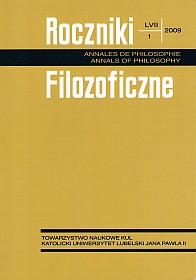„Twardy” problem realizmu metafizycznego i współczesny antyrealizm
Abstrakt
The aim of the article is to consider the problem of metaphysical realism that is defined as the thesis that there are objects that are independent of human consciousness. The problem was not solved by I. Kant, since he assumed, without a justification, that there are objects (“things in themselves”) that are the causes of human mental states. The author interprets the problem of metaphysical realism in the context of the so-called principle of immanence (“principle of consciousness”), according to which every entity (object) may be treated exclusively as a correlate of consciousness. The principle of immanence is the cause why even causal relations have to be treated as only certain data for the consciousness, and hence they may not be referred to by asserting that there is a factor that is the cause of states of human consciousness. Contemporary anti-realism, as the so-called conceptual realism, does not consider the problem of metaphysical realism in the context of the principle of immanence, and hence it is not a part of the traditional dispute on the existence of the (external) world. The author sees the solution to the problem of metaphysical realism in combining two arguments: in the reference to the ontological proof, which – via God’s veracity – is to “lead outside” the immanence of consciousness, and in the reference to the concept of participation in such a way that the human mind participates in God and it is Him that is the real entity (ens realissimum) that is referred to by the dispute about the existence of the world and the problem of metaphysical realism.
Bibliografia
Ajdukiewicz K.: Zagadnienia i kierunki filozofii [1949], Kęty: Antyk 20044.
Alston W. P. (red.), Realism & Antirealism, Ithaca–London: Cornell University Press 2002.
BonJour L.: Defense of Pure Reason: A Rationalist Account of A Priori Justification, Cambridge: Cambridge University Press 1998.
Butchvarov P.: Skepticism about the External World, New York–Oxford: Oxford University Press 1998.
Carnap R.: Scheinprobleme in der Philosophie. Das Fremdpsychische und der Realismusstreit, Berlin 1928.
Craig E.: Realism and Antirealism, [w:] tenże (red.), Encyclopedia of Philosophy, t. 8, London–New York: Routledge 1998, s. 115-119.
Devitt M: Realism and Truth, Oxford: Oxford University Press 1991.
Dummett M.: Realism [1963], [w:] tenże, Truth and Other Enigmas, London: Duckworth 1978, s. 145-165 (pol. Realizm, „Principia” 6 (1992), s. 5-31).
Hartmann N.: Grundzüge einer Metaphysik der Erkenntnis, Berlin: Walter de Gruyter & Co. 19494.
Hume D.: Treatise of Human Nature [1739], ed. L. A. Selby-Bigge, Oxford: Clarendon Press 1951.
Husserl E.: Idee czystej fenomenologii i fenomenologicznej filozofii. Księga pierwsza, tłum. D. Gierulanka, Warszawa: PWN 1975.
Ingarden R.: O niebezpieczeństwie ‘petitionis principii’ w teorii poznania [1921], [w:] tenże, U podstaw teorii poznania, Warszawa: PWN 1971, s. 357-381.
Ingarden R.: Spór o istnienie świata, t. 1-2, Warszawa: PWN 19873; t. 3, Warszawa: PWN 1981. Wyd. I: 1947 (t. 1) i 1948 (t. 2). T. 3, z podtytułem O strukturze przyczynowej świata realnego, napisany przez Ingardena po niemiecku, został wydany przez Max Niemeyer Verlag (Tübingen 1974).
Jadacki J. J.: Spór o granice poznania. Prolegomena do epistemologii, Warszawa: PWN 1985.
Judycki S.: Sceptycyzm i dowód ontologiczny, „Analiza i Egzystencja” 1 (2005), s. 9-29.
Kant I.: Krytyka czystego rozumu, tłum. R. Ingarden, Warszawa: PWN 1986.
Kotarbiński T.: Elementy logiki formalnej i metodologii nauk [1926, 1929], Warszawa: PWN 1986.
Mackie J.: Ethics – Inventing Right and Wrong, London: Penguin 1977.
Perler D.: Zweifel und Gewissheit. Skeptische Debatten im Mittelalter, Frankfurt am Main: Vittorio Klostermann 2006.
Philipse H.: Transcendental Idealism, [w:] B. Smith, D. W. Smith, The Cambridge Companion to Husserl, Cambridge: Cambridge University Press 1995, s. 239-322.
Putnam H.: Aristotle after Wittgenstein, [w:] R. W. Sharples (red.), Modern Thinkers and Ancient Thinkers, London: UCL Press 1993.
Putnam H.: Reason, Truth and History, Cambridge: Cambridge University Press 1981.
Putnam H.: Representation and Reality, Cambridge, Mass.: MIT Press 1989.
Stępień A. B.: Wstęp do filozofii, Lublin: TN KUL 20014.
Williamson T.: Vagueness in Reality, [w:] S. Shapiro (red.), The Oxford Handbook of Philosophy of Mathematics and Logic, Oxford: Oxford University Press 2005.
Woleński J.: Epistemologia, Warszawa: Wydawnictwo Naukowe PWN 2005.
Copyright (c) 2009 Roczniki Filozoficzne

Utwór dostępny jest na licencji Creative Commons Uznanie autorstwa – Użycie niekomercyjne – Bez utworów zależnych 4.0 Międzynarodowe.





